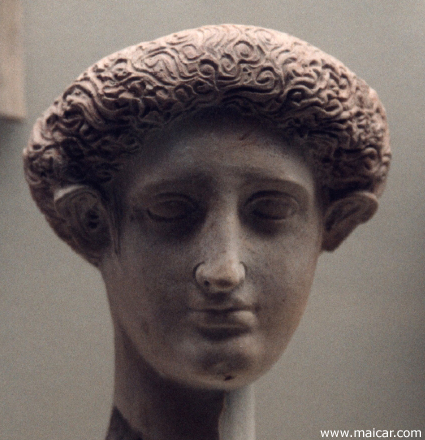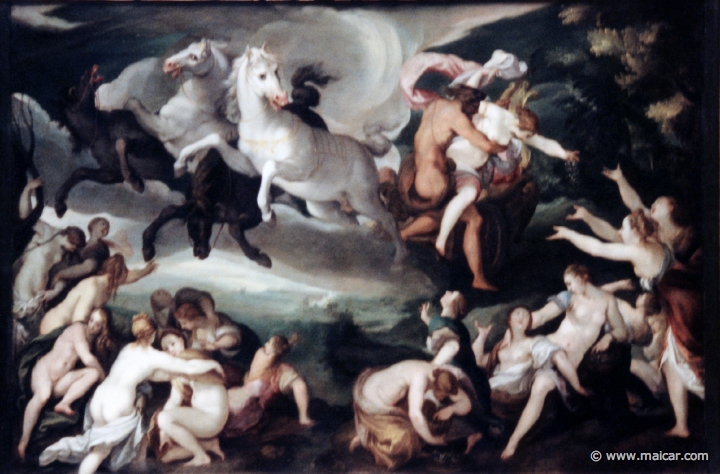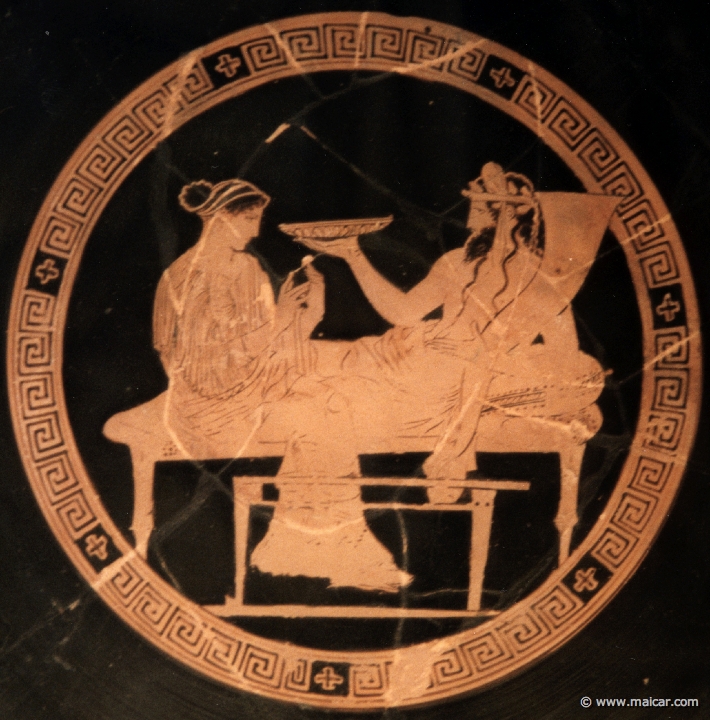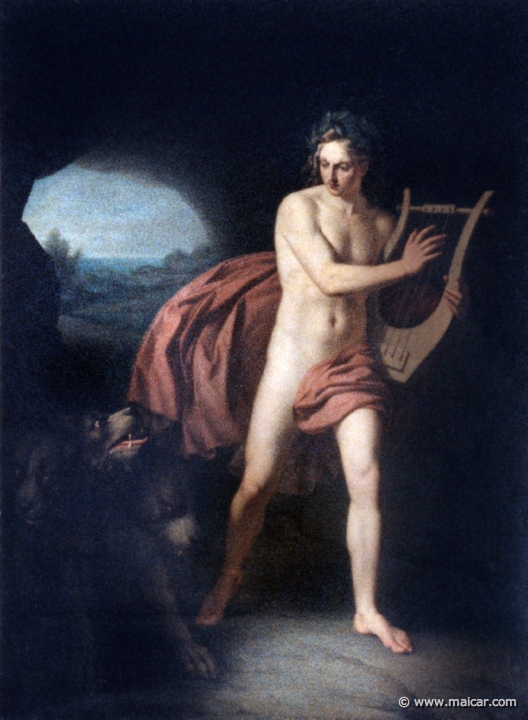|

|
Persephone. 5621: Perséphone. Tarente. Terre cuite polychrome. Musée d'Art et d'Histoire, Genève.
|
|
|
Odysseus: "Mother … why do you avoid me when I try to reach you, so that even in Hades we may throw our loving arms around each other's necks and draw cold comfort from our tears? Or is this a mere phantom that grim Persephone has sent me to accentuate my grief?"
Anticlia 1: "My child, my child! … This is no trick played on you by Persephone … You are only witnessing here the law of our mortal nature, when we come to die." (Homer, The Odyssey 11.210).
"It is also said that on reaching old age a vision came to Pindar in a dream. As he slept Persephone stood by him and declared that she alone of the deities had not been honored by Pindar with a hymn, but that Pindar would compose an ode to her also when he had come to her. Pindar died at once, before ten days had passed since the dream. But there was in Thebes an old woman related by birth to Pindar who had practised singing most of his odes. By her side in a dream stood Pindar, and sang a hymn to Persephone. Immediately on waking out of her sleep she wrote down all she had heard him singing in her dream." (Pausanias, Description of Greece 9.23.3).
"They say that the soul of man is immortal, and at one time comes to an end, which is called dying, and at another is born again, but never perishes. Consequently one ought to live all one's life in the utmost holiness. For from whomsoever Persephone shall accept requital for ancient wrong, the souls of these she restores in the ninth year to the upper sun again …" (Plato, Meno 81b).
…
Pale, beyond porch and portal,
Crowned with calm leaves, she stands
Who gathers all things mortal
With cold immortal hands;
Her languid lips are sweeter
Than love's who fears to greet her
To men that mix and meet her
From many times and lands.
… (Algernon Charles Swinburne 1837-1909, The Garden of Proserpine).
|
|
Persephone is Core, the Maiden, "the goddess of
twofold name". She became queen of the Underworld after
being abducted, while she was gathering flowers, by Hades, who had fallen in
love with her.
The occasion of the abduction
It is told that Hades asked Zeus to give him
Persephone in marriage; and since Zeus deemed that Demeter would not allow
her daughter to live in the gloomy Underworld, he told
his brother to seize her as she was gathering
flowers. So Hades did,
near Mount Aetna or near Henna (i.e. Enna, where a
temple of Demeter was
built), or near Syracuse in Sicily—a favorite
home of Demeter for its fertility—on the occasion when Arethusa 3, one of the NYMPHS, had invited the goddesses to a banquet. They came with their daughters, whom they left
to roam unguarded through the meadows, where the
girls started filling baskets with marigolds, and
violets, and poppies, and hyacinths, and
everlasting amaranths, and roses, and all kinds of
bright flowers, some of them without a name.
Persephone herself, they say, plucked crocuses and
white lilies or violets, but while plucking and
gathering, she strayed far so that none of her
companions followed her. It was then that Hades seized her, and bore
her into his own realm.
Cyane 1
While he galloped through lakes and springs, the naiad Cyane 1, standing forth from her pool, shouted at him:
"No further shall you go! … The maiden should have been wooed, not ravished …" (Cyane 1 to Hades. Ovid, Metamorphoses 5.414).
But Hades smote the
pool to its bottom, opening a road to the Underworld; and that is why some say that it was the god who caused the fountain named Cyane to gush forth in the neighborhood of Syracuse. In the meantime, Cyane 1, having failed to stop the god, dissolved away in tears because of her pain, and melted into her own waters. Later, when Demeter came to the
fountain looking for her daughter, there was no
naiad to tell her what had happened; but still the
goddess could see Persephone's girdle floating on
the surface of the pool.
Cries in all directions
When Persephone was seized, she cried out:
"Ho dearest
mother, they are carrying me away!" (Ovid, Fasti 4.447).
… for that is the proper thing to do for an abducted girl. But the god, having taken Persephone away in his chariot, cleft the earth and descended with her to the Underworld. As often
happens, she was missed though too late, and those
who first called her nicely:
"Persephone,
come to the gifts we have for you." (Ovid, Fasti 4.452).
… ended up filling the mountain with shrieks and smiting their own bosoms with their hands. Some of them, it is told, became the SIRENS, after having sought Persephone in vain through many lands. There are those who say that Persephone, when
she was abducted, was accompanied by Aphrodite, Artemis and Athena; but others have
mentioned several OCEANIDS among her playmates: Electra 1, Ianthe 1, Rhodia 1, Callirrhoe 1, Melobosis, Tyche, Ocyrrhoe 1, Chryseis 1, Ianira 1, Acaste 1, Admete 1, Pluto 1, Calypso 2, Styx, Urania 1, and Galaxaure.
|

|
Hades ravishing Persephone. 4724: Joseph Heintz der Ältere, 1564-1609: Der Raub der Proserpina, um 1595. Gemäldegalerie Alte Meister, Dresden.
|
|
Demeter distressed
Most distressed was the girl's mother Demeter, who went about
seeking her child all over the earth, by night and
day with torches kindled in the craters of Mount
Aetna, crying "Persephone", and "Daughter", and
asking whoever she met the one question:
"Did a girl
pass this way?" (Demeter to anyone.
Ovid, Fasti 4.488).
This was Demeter's
darkest moment; and she tore her locks and smote
her breast; and reproaching the whole world, she
broke in pieces the plows, destroyed farmers and
cattle, made barren the plowed fields, and blighted
the seed.
Because of Love
And yet, they say, it was Love who caused everything.
For Aphrodite feared
that Persephone, following Athena and Artemis, would also
remain a virgin. That is why she instructed her son Eros to join the young girl
to her uncle. And Eros, who
rules the gods and controls all deities, selected
the sharpest among his many arrows, and with it
smote Hades through the
heart; and since when this happens nothing can be
done, Hades abducted
Persephone when she, not far from the city of Henna
(as some say), was playing and gathering flowers in
a grove. At the time, she was so girlish and
innocent that she is believed to have felt more
pain for the loss of the flowers that fell out of
her loosened tunic when Hades seized her, than
fear for being captured; but she nevertheless
called on her mother and companions while Hades galloped away.
Demeter demands her
daughter
Some have asserted (but see also Demeter) that it was Arethusa 3—whom the river god Alpheus loved—who first reported to Demeter that Persephone
was in the Underworld. For she
had seen her when herself glided beneath the earth.
Persephone, she said, seemed sad and perturbed with
fear, but on the other hand, she had become a
queen. On hearing this, Demeter set forth in her
chariot to heaven and asked Zeus the restoration of
their daughter, saying:
"… That she has been stolen, I will bear, if only he will bring her back; for your daughter does not deserve to have a robber for a husband." (Demeter to Zeus. Ovid, Metamorphoses 5.520).
Yet Zeus replied:
|

|
Hades and Persephone banqueting. 8319: Red-figured kylix (drinking-cup): Pluto and Persephone banqueting. Athens c. 440-430 BC. British Museum, London.
|
|
"… If only we are willing to give right names to things, this is no harm that has been done, but only love … But if you so greatly desire to separate them, Persephone shall return to heaven, but on one condition only: if in the lower-world no food has as yet touched her lips. For so have the MOERAE decreed." (Zeus to Demeter. Ovid, Metamorphoses 5.524).
The seeds of pomegranate
But the girl, given to plucking even in the Underworld, had already taken a pomegranate and eaten one seed or seven of its seeds, as Ascalaphus 2, the son of the infernal river Acheron and only witness, could testify. And because of his tittle-tattle, Persephone's return to the upper world was thwarted. Now, some may reason that Ascalaphus 2's gossip is unimportant, and may argue that the MOERAE's decree could not
be changed, with or without gossip; but by arguing
in such a way they only prove that they ignore how
fate works. But Demeter knows, and that is why she turned Ascalaphus 2 into a short-eared owl, showing what a tattling tongue may cause to his/her owner. And she also knows because the MOERAE themselves persuaded her to lay aside her wrath and
moderate her grief; for at the time, Demeter the Black, as
the Phigalians of Arcadia surnamed her
because of her attire, was letting all the fruits
of the earth perish, and the human race die through
famine.
The year parcelled
Since that condition, which Zeus had mentioned, could
not be fulfilled, Persephone remained in the Underworld, married
to its lord Hades. Yet Zeus did not wish to break
the balance between his brother and his sister, and
that is why he divided the year into two equal
parts, so that Persephone spends half of the time
with her mother, and half with her husband. Others
say, however, that he ruled that Persephone should
go down to the Underworld for the
third part of the year, but for the two parts
should live with her mother and the other gods in
Heaven, in a similar way as it was later ruled in Adonis' case. For when Adonis was
still a child, Aphrodite hid him in a
chest because of his beauty, entrusting it to
Persephone. But when Persephone saw him, she would
not give him back; such was his beauty. Also this
case was tried before Zeus,
who divided the year into three parts, so that Adonis should stay by
himself for one part, with Persephone for another
part, and with Aphrodite for the
remainder. This was done as the lord of heaven
ruled, but Adonis gave to Aphrodite, whom he
loved, his own share in addition.
Queen of the Underworld
|

|
Orpheus: Persephone loved his song. 7217: Angelo Scetta: Orfeo all'Inferno (1845 circa). National Archaeological Museum, Naples.
|
|
This is how Persephone, who loved to gather
flowers, became the queen of the Underworld, having
there a grove, with tall black poplars and willows,
called after her. And she was comforted by Hades, who told her:
"… I shall be no unfitting husband for you among the deathless gods, that am own brother to father Zeus. And while you are here, you shall
rule all that lives and moves and shall have the
greatest rights among the deathless gods: those who
defraud you and do not appease your power with
offerings, reverently performing rites and paying
fit gifts, shall be punished for evermore." (Hades to Persephone, Homeric
Hymn to Demeter 2.363).
Helps Orpheus
And when Orpheus came
to the Underworld looking for his wife, Persephone was the first to
be entranced by his song, which persuaded her to
help him in his desire to bring back to life his
dead wife.
Pirithous loved her
Later Pirithous, a
friend of Theseus,
wished to marry Persephone; and with that bizarre
purpose in mind, he descended to the Underworld. But for
that attempt he sits forever in the Chair of
Forgetfulness on which he is held fast by coils of
serpents, although some say that Heracles 1 asked Hades for him, and brought
him up unharmed.
Helps Heracles 1
It was by her favor, some say, that Heracles 1 received Cerberus 1 in chains; and when Menoetes 1, the Herdsman of Hades,
challenged Heracles 1 to wrestle and had his own ribs broken, he was let
off by Heracles 1 at the request of Persephone (see also HERACLES 1'S LABOURS).
Helps Tiresias
And when the seer Tiresias came to the Underworld after his death, Persephone granted that he alone among the shadows of the dead should keep understanding. Such is her power, and that is why the Underworld may be referred to as the "sunless house of Persephone", or the "sacred floor of Persephone", or "the couch of Persephone", or "Persephone's gloomy roof", or "the dark-walled home of Persephone"; and the dead as "the portion of Persephone". And some, fearing Death, call Persephone awful or dread, but others call her the "fair young goddess of the nether world."
|